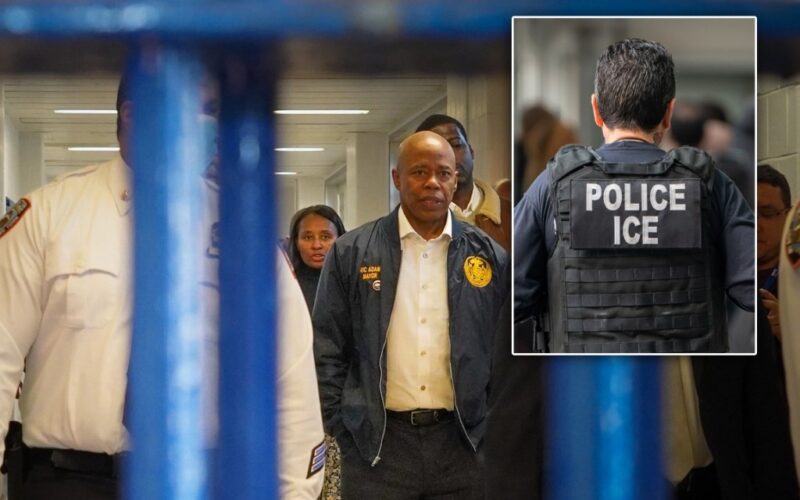Even as Mayor Adams was inviting federal immigration officials onto Rikers Island, his administration failed to give Department of Correction staff basic training about city rules limiting disclosure of information on undocumented people held in the jails, a new watchdog report states.
Administration officials began publicly floating reopening the Immigration and Customs Enforcement office on Rikers as early as December, around the time Adams met with Border Czar Tom Homan. But the city Department of Investigation found DOC did not give any guidance to jails staff on the rules for information disclosure.
The department also didn’t give any training to its officers about New York’s “sanctuary city” laws or DOC policies, according to the report.
The findings stem from a DOI investigation into two incidents uncovered this past February where a DOC investigator illegally passed on information to ICE about two people held in the jails, the report said.
In each instance, the report concluded, the DOC investigator did not know he was barred under law and city policy from providing that information since it was for possible deportation rather than part of an investigation into crimes.
“New York City law and DOC policy do not allow city resources to be used for the purpose of facilitating the enforcement of federal immigration law, and that prohibition includes the sharing of information with our federal law enforcement partners for that purpose,” DOI Commissioner Jocelyn Strauber said in a statement.
“DOC failed to provide proper guidance and training to DOC staff about how to comply with city law and DOC’s own policy,” Strauber said. “DOC should conduct a department-wide audit to identify any other similar violations to the ones uncovered in this report.”
A question to Correction officials was referred to City Hall, which did not immediately respond.
CORRECTIONS
James Keivom/New York Daily News A New York City Department of Correction officer is pictured in Rikers Island’s George R. Vierno Center in this file photo. (James Keivom/New York Daily News)
The investigation began when someone advised DOI that on Feb. 3, the DOC investigator had tipped off the Department of Homeland Security that Cristian Concepcion, of Venezuela, was being released onto an MTA bus, so they could detain him, the report said.
The initial tip stated “officers” — plural — had tipped off federal authorities, the report said.
Concepcion had pleaded guilty to misdemeanor assault, which does not rise to the level of a “serious or violent crime” under city law. His original charge when he was arrested in June 2024 was attempted murder in Brooklyn.
When he got off the bus after his release, seven ICE agents in a DOC black van that had followed him over the Rikers Island Bridge to the island’s “welcome” sign in Astoria, jumped out and tackled him, then loaded him into an unmarked four-door vehicle and drove off, the report said.
The White House then touted the arrest on social media, describing Concepcion as a gang member. He is no longer listed in the ICE system, records show, suggesting he has been deported.
Similarly, the same Correction investigator provided information to Homeland Security in November in the case of Pedro Mujica Villa Nueva, who was also detained by ICE agents. Villa Nueva originally entered the system on July 12, 2024, charged with bail jumping and grand larceny.
He pleaded guilty on April 7 to bail jumping and was sentenced to a conditional discharge before he was released in November.
DOI concluded the investigation didn’t understand the distinction between passing information to the feds as part of a criminal probe versus when the individual was merely in the U.S. illegally.
In the report, DOI recommended DOC conduct an audit to look for other examples of improper information disclosure and improve training.
Correction officials replied they had “reiterated” the rules and regulations to staff, but called an agency-wide audit “impractical.”
Mayor Adams first publicly discussed allowing an ICE office on Rikers Island toward the end of last year. In April, his first deputy mayor, Randy Mastro, issued an executive order allowing the establishment of an ICE office on Rikers.
The City Council sued over the executive order and won a preliminary injunction in June preventing the office. On Sept. 8, Manhattan Supreme Court Justice Mary Rosado invalidated the executive order declaring the Adams administration had a conflict of interest — that it was in the mayor’s interest to establish the ICE office since the feds had dropped the corruption case against him.
“The timeline of public statements and the ongoing criminal prosecution so clearly demonstrate an impermissible appearance of a conflict of interest,” Rosado wrote. “The appearance of this conflict and Mayor Adams’ failure to recuse himself fully tainted the entire process.”
Asked about the findings, Mayor Adams bickered with a reporter during a housing press conference in Queens after the reporter mistakenly indicated several officers had been found to have tipped off the feds.
“They found in their report the action of the officer wasn’t intentional, either,” Adams said. “He made a mistake. Human beings make a mistake.”
Adams then cut short the press conference and departed.
In a statement, a mayoral spokesperson said, “As Mayor Adams has repeatedly stated, New York City does not — and will not — participate in civil immigration enforcement, in accordance with local law. We were disappointed to learn that a Department of Correction employee — acting independently and without direction or consultation from a supervisor — unknowingly failed to follow city law and DOC policy related to immigration enforcement.
“To be clear, no one at DOC or within New York City government — aside from the employee himself — had any role in or knowledge of the sharing of sensitive information with federal officials. As soon as DOC became aware of the incident, they took immediate action, including dedicated training sessions and agency-wide reminders on DOC policy and our local laws. DOC has also implemented DOI’s recommendations to ensure incidents like this do not happen again.”
Chris Sommerfeldt contributed to this story
Originally Published:








